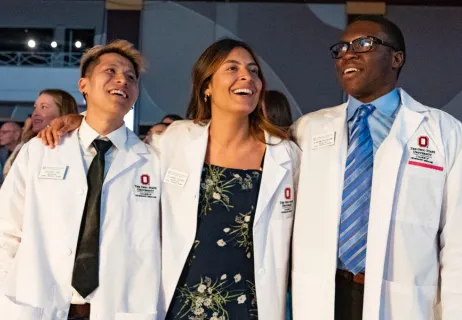Find out more about our DVM Program
Whether you're a prospective student with dreams of a rewarding veterinary career, a high school or middle school student curious about the path to becoming a veterinarian, or someone eager to visit our college, this section is your resource hub to point you in the right direction. Explore the links to find out more about our DVM program and discover the many opportunities waiting for you at Ohio State's College of Veterinary Medicine. Start your journey into the world of veterinary medicine with us today!
Changing the landscape of veterinary medicine BEGINS HERE!
Get to know the class of 2029
Professional Program Goals
Our professional program goals are designed to shape confident and competent veterinarians. Graduates of the College of Veterinary Medicine are equipped with a solid medical knowledge foundation, essential clinical skills for patient care, robust professional and interpersonal abilities, effective problem-solving capabilities, and the skills required to promote health and prevent disease. These goals drive our ambition to BE THE MODEL® comprehensive college of veterinary medicine in the world, nurturing the next generation of veterinarians who can make a meaningful impact in the field.
- Have a broad working knowledge of the scientific concepts, principles, and processes relevant to the current practice of veterinary medicine
- Understand the role of scientific inquiry (i.e., research) in the advancement of medical knowledge
- Can obtain, evaluate, and apply new knowledge in the diagnosis, treatment and prevention of disease
- Effectively apply basic medical skills in the diagnosis and treatment of patients
- Effectively apply basic surgical skills in the treatment of patients
- Administer analgesics and anesthesia with appropriate concern for patient welfare
- Provide basic emergency treatment and critical care
- Provide timely documentation in medical records that is clear, concise, and organized to optimize patient care and minimize errors
- Demonstrate good oral and written communication skills with clients, colleagues, team members, and the general public
- Interact compassionately with patients and clients
- Demonstrate sensitivity to and respect for the emotional attachment of clients to their animals and their financial concerns
- Collaborate effectively with colleagues and technical staff to facilitate patient care; give and receive performance feedback in a constructive manner
- Recognize and uphold the veterinarian's professional, legal and ethical obligations to animals, animal owners, professional colleagues and society
- Understand the importance of sound business and financial management principles to the practice of veterinary medicine
- Are self-motivated learners and critical thinkers
- Utilize effective strategies for self-improvement and recognize the need for life-long learning to maintain and improve clinical competence
- Utilize information technology to retrieve, manage, and apply biomedical information for the diagnosis and management of individual patients and populations
- Recognize their strengths, weaknesses, and limitations; seek help and advice when needed, including case referral where appropriate
- Demonstrate the ability to apply basic disease prevention and health promotion practices to individual patients and populations
- Recognize important zoonotic and foreign animal diseases and be able to articulate appropriate diagnostic, prevention, and control strategies
- Contribute to improved public health by promoting food safety, food security, and biosecurity practices that reduce the spread of infectious diseases in human and animal populations
Step boldly into your future as a DVM
Throughout your veterinary education you'll experience several milestones. Learn more about these momentous occasions and how your loved ones can celebrate with you.
Contact Us
VMC Suite 005
601 Vernon L. Tharp St
Columbus, Ohio 43210
Office Hours: 9 a.m. - 4 p.m
CVMPPS@osu.edu
Resources for Current Students on CVM Community (OSU login required)
Emily Gonzalez
VMC Suite 005
601 Vernon L. Tharp St
Columbus, Ohio 43210
614-247-8778
CVM-DVMFinancialAid@osu.edu
127 Veterinary Medicine Academic Building
1900 Coffey Road
Columbus, Ohio 43210
Office Hours: 8 a.m. - 5 p.m.
614-292-7586
DVMprospective@osu.edu
https://vet.osu.edu/education/dvm-admissions
Student Academic Services Building
281 W Lane Ave
Columbus, Ohio 43210-11328
614-292-9444
gpaadmissions@osu.edu
https://gpadmissions.osu.edu/
Mailing Address (for Official Transcripts)
Graduate and Professional Admissions
PO Box 182004
Columbus, OH 43218-2004
More Info: https://registrar.osu.edu/alumni/index_transcript.asp


